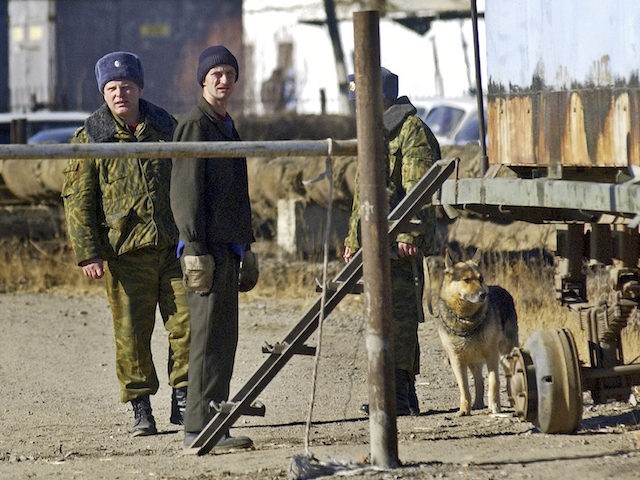A poll released by Russia’s state-funded VTsIOM polling agency on Tuesday found seven out of ten Russians supporting the return of gulag labor camps, a notorious Stalinist practice that used prisoners for slave labor on state construction projects.
The Moscow Times explained that a Gulag 2.0 would supposedly be more humane than the notoriously brutal and deadly forced labor camps established by Joseph Stalin in the 1920s and fully exposed to the Western world by dissident writer Alexandr Solzhenitsyn in his landmark 1973 book The Gulag Archipelago.
Stalin’s gulags held millions of inmates at their peak, including political dissidents, purged Communist Party officials, and random unlucky Soviet citizens in addition to convicted criminals. Tens of thousands of those inmates died every year from accidents, starvation, summary execution, and simply being worked to death.
The new labor camp proposal polled by VTsIOM would involve “dispatching around 188,000 inmates to fill part of the shortage created by a coronavirus-driven exodus of Central Asian migrant workers,” as the Moscow Times put it.
The idea has been floated by “several cabinet ministers, the state railway monopoly and the head of Russia’s penitentiary system.”
None of these parties seems to enjoy comparisons between their labor camp idea and the Stalinist gulags, although the Moscow Times said they have been getting some cover from revisionist-history op-eds in state media that seek to minimize the horrors of the original gulags or even recast them as beneficial work programs for the poor, much like the way today’s Chinese Communist Party attempts to justify its labor camps for the Uyghur Muslims.
One of those whitewashing articles, penned by columnist Victoria Nikiforova of the RIA news service on May 26, gushed that Stalin’s gulags were a “social elevator” for the poor that only seemed “quite unpleasant” to elite prisoners accustomed to lodging in luxury hotels. Her comment about social elevators promptly became an unflattering viral sensation among skeptical Russian readers, who had a field day posting her quote alongside old photos of beaten, starving, bloodied gulag inmates.
Nikiforova predicted the new gulags would likewise be a boon to the poor and Russian society at large, since they would inculcate a “healthier attitude towards physical labor” and serve as “additional drivers of the labor market in Russia.”
The aforementioned head of the Russian Federal Penitentiary Service (FSIN), Alexander Kalashnikov, insisted last week that his proposed labor camps would not be gulags.
“The conditions there will be completely different because an individual will be working and living in a communal home, or rent an apartment and live with their family if they like. They will also be paid well,” he said.
Respondents to the VTsIOM poll tended to see labor camps as a reasonable use of prisoners for productive ends, a way for criminals to repay the Russian state for the expense of housing them, and even as a way for prisoners to earn money for the families while learning useful skills.
58 percent of respondents thought work camps would help ease the transition of prisoners back into normal life. 62 percent thought “prisoners themselves will prefer to serve their sentences” in correctional labor camps, a figure that jumped to 74 percent among respondents 18-24 years old.

COMMENTS
Please let us know if you're having issues with commenting.